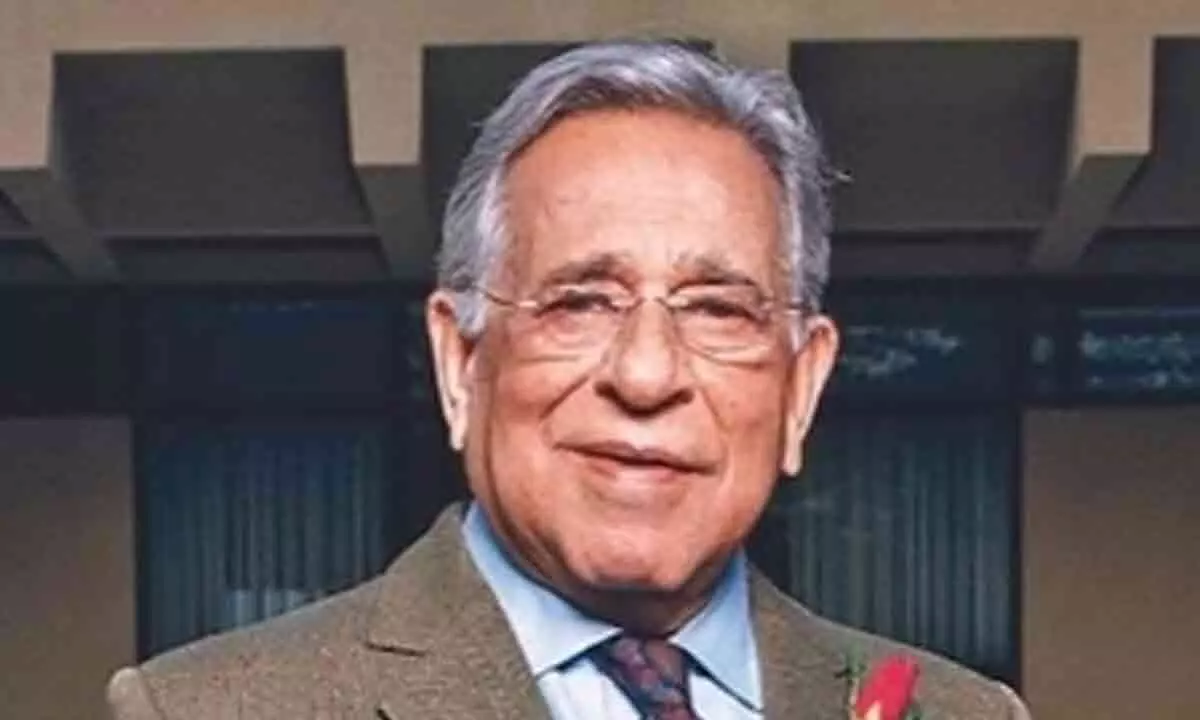Live
- India is 'Mother of Democracy': PM Modi
- ‘One nation, one election’ will undermine India’s federal structure: Mehbooba Mufti
- ‘Bachhala Malli’ trailer heightens anticipation
- Karnataka quota row: Backward Class forum chief warns Lingayat seer over 'tinkering with reservations'
- Tight security arrangements at Group-II examination centers District SP
- Alia Bhatt captures attention in white
- Varun Dhawan talks about ‘Baby John’
- ‘Moonwalk’ trailer promises a quirky heist, love, and loyalty
- Combat leaf spot disease
- Ahsaas Channaopens up about her complex character in ‘Mismatched 3’
Just In
The man who defined luxury and set the gold standards for Indian hotels

Rattan Keswani still remembers this embarrassing episode from his long association with the doyen of Indian hospitality, Prithvi Raj Singh 'Biki' Oberoi.
New Delhi : Rattan Keswani still remembers this embarrassing episode from his long association with the doyen of Indian hospitality, Prithvi Raj Singh 'Biki' Oberoi. It is worth recounting, for it tells a lot about the man who defined luxury -- not just The Oberoi Group.
One evening, Oberoi summoned the Delhi hotel's executive chef to tell him that the smoked salmon he had just served was not right because the onion rings on top were wrong. The chef, being a proud man, said that he had served the salmon just the way the Bible of cookery, 'Larousse Gastronomique', had said it should be.
"No, it does not say so. Get me the 'Larousse'," Oberoi shot back. The venerable book was produced and, yes, the 'Grand Old Hotelier' was right.
The problem, it turned out, was that the French used white onion rings that were not pungent, and therefore sat well on salmon, unlike Indian onions, which overpowered the original taste! Oberoi ended the discussion with his customary expression of displeasure: "What can I say to that?"
Seasoned hoteliers and old Oberoi hands such as Keswani (he's also the author of the book 'Check In Never Check Out') can recount such incidents by the dozen from Biki Oberoi's life. Oberoi passed away on Tuesday, November 14, at the age of 94.
For a man who spent the first five decades of his life literally living the good life, hobnobbing with Monaco's royalty one evening, having a blast with European nobility at Cannes on the next, Oberoi proved to be not only a fast learner, but also immensely capable of topping up the legacy of his illustrious father, Rai Bahadur Mohan Singh Oberoi, founder of the hotels that bear his name.
Stories about him can fill up a book -- from his love for red lipstick, which is why every woman employed in front desk and guest relations positions in The Oberoi Group has to wear it, to his knowledge of such operational details as where to source low-cholesterol eggs for breakfast or the storage capacity of underground water tanks in his hotels.
It was his eye for details that made The Oberoi Group synonymous with luxury. Biki Oberoi kept reminding his senior executives, "Hospitality is all about common sense, which is so hard to find."
And luxury, according to him, was not about in-your-face grandeur, but unique experiences and seamless service. Seasoned Oberoi hands still remember how he remembered every detail of every process, from room service standards to F&B margins, as Keswani puts it, "down to the bone".
Biki Oberoi expected each of his senior executives to have his grasp over the details of the zillions of processes that keep hotels working 24x7.
People in the hospitality industry remember Oberoi, who formally took over the reins of the company from his father in 2002, for having lifted up the group from what insiders used to describe as the "InterContinental-Sheraton" style of hoteliering -- very businesslike and American -- to a new level of Asian luxury.
He achieved this by turning around The Oberoi InterContinental (opened in 1965); by opening The Oberoi Mumbai in 1986, literally across the road from the jaded Oberoi Sheraton (the present Trident Nariman Point), which had been operating since 1974; by restoring The Oberoi Grand Kolkata to is former glory; and by rolling out the Vilas hotels, starting with Jaipur, to set new benchmarks for Indian luxury.
And it could only have been a hotelier as finicky as Biki Oberoi to shut down his flagship property, The Oberoi New Delhi, for two years so that it could be rebuilt and ooze a more contemporary luxury.
Jay Rathore, who oversaw the turnaround, still remembers with amazement his employer's phenomenal memory for details, including the exact locations of the hotel's original load-bearing beams. Oberoi's message was as clear as daylight: Do not follow your competion; instead, define the competition.
He had made this point once to Keswani, who was recounting to him once how he, as a mere rooms division manager, had overheard him berating senior managers for the way food preparations had been garnished during a promotion at Harrods London.
Oberoi explained to Keswani that 90 per cent of The Oberoi's guests were foreigners and it would be foolhardy for chefs to garnish Indian preparations with uncooked ingredients, from shavings of paneer to diced onions and coriander leaves, no matter how good they looked. Chances of foreign guests getting stomach bugs from uncooked garnishes were greater, therefore they were best avoided, no matter what the competition did.
No hotelier today can claim to have this kind of depth of knowledge about their business, but then, PRS 'Biki' Oberoi was in a league of his own. His passing truly marks the end of an era not only for luxury hotels, but also for Corporate India.

© 2024 Hyderabad Media House Limited/The Hans India. All rights reserved. Powered by hocalwire.com






